
About Andrew Cusack
 Writer, web designer, etc.; born in New York; educated in Argentina, Scotland, and South Africa; now based in London.
Writer, web designer, etc.; born in New York; educated in Argentina, Scotland, and South Africa; now based in London. read more
News
Blogs
Reviews & Periodicals
Arts & Design
World
France
Mitteleuropa
Knickerbockers
Argentina
The Levant
Africa
Cape of Good Hope
Netherlands
Scandinavia
Québec
India
Muscovy
Germany
Academica
Hitchcock in Québec
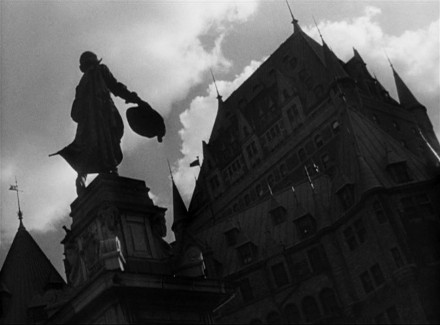
QUÉBEC, THAT STRANGE and charming province, is a most intriguing nation. It is where the British, French, and American tendencies clash and combine to form that most peculiar of all American varieties: le Québécois. Of course, since the 1960s Québec has become more French; no, not more French but more like France in that every year it plunges deeper into the depths of self-loathing: that hatred of one’s own tradition and history which has so marked out “the new Europe”. It is a race to assert one’s self by destroying any living connection to one’s past. Un jeu du fou. More’s the pity, as this once-vibrant melting pot of traditions expressed itself in interesting ways.
A splendid display of this Québec can be found in Alfred Hitchcock’s 1953 drama I Confess. The film had been recommended to me often and I finally got around to seeing it tonight. I won’t give away any of the plot, which is a good one, but Hitchcock lives up to his reputation with his excellent framing of the scenes. (Though I must admit, half of it is merely the settings in the Ville de Québec themselves). They include a peek into the Québécois Parliament. Above the Speaker’s dais is displayed not only the Sovereign’s arms, but also a crucifix, exhibiting our loyalties both temporal and spiritual. In the court room you find yet another blend of the Anglo and the French. As you no doubt recall from our handy little map, Quebec is a country with a mixed legal system. Founded as Nouvelle-France it had the civil system derived from the Romans. Captured by the British and later transformed into part of the Canadian Confederation, it has accrued layers of the Common Law so dear to we Anglos. The officials of the court wear British-style robes — the judge even has a tricorn hat — but over the jury looms a large crucifix. English government and French culture tempered by Catholic truth; not a bad mixture.
Anyhow, if you haven’t seen the film yet, here are a few snaps to enjoy until your Hitchcockian thirst is satiated.
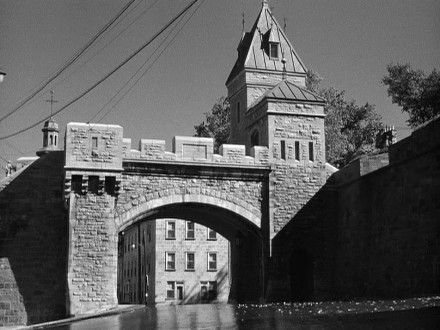
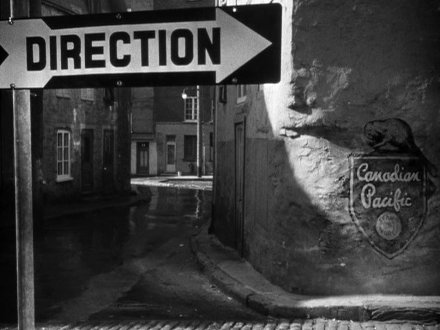
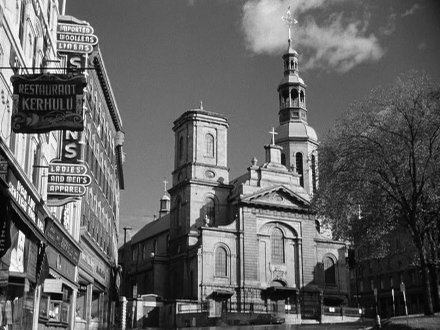
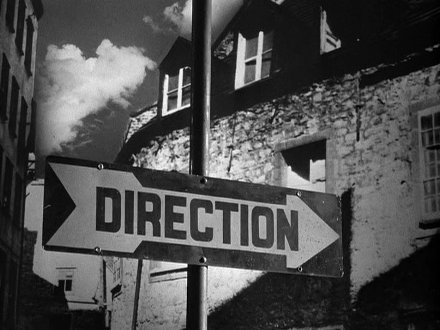
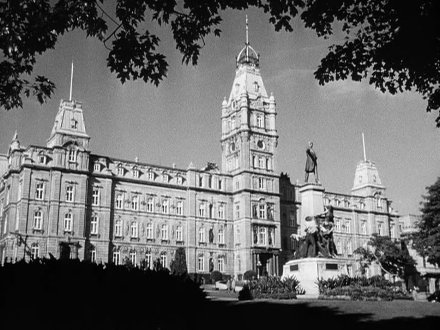
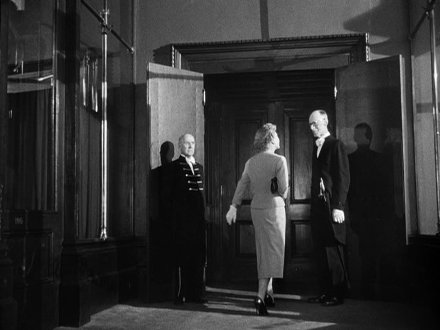
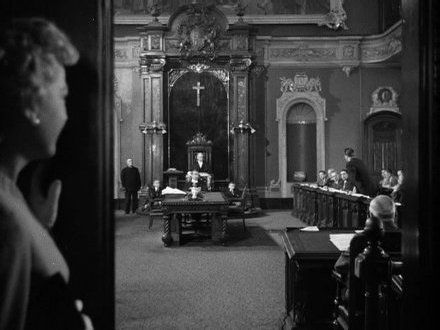
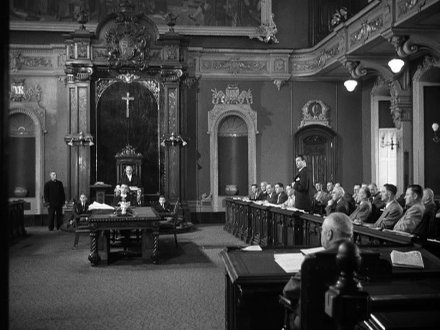
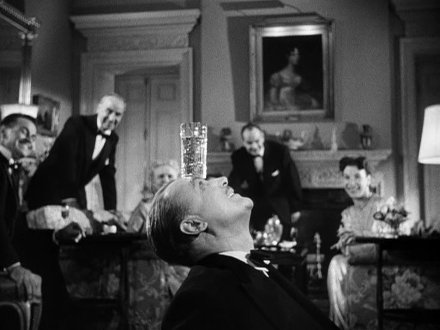
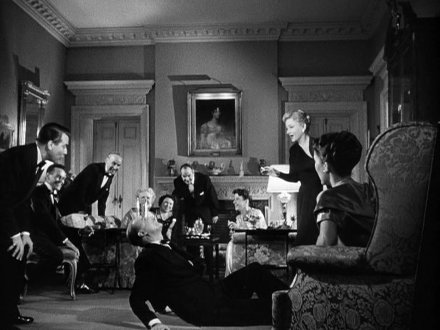
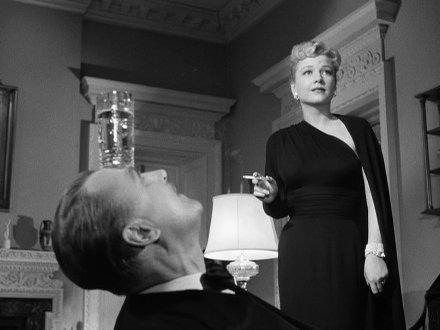
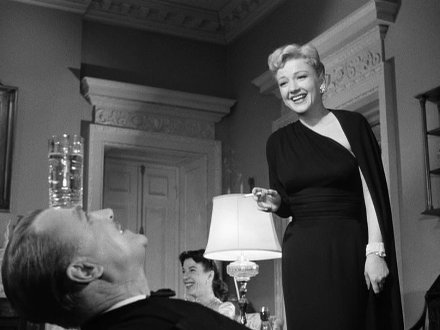
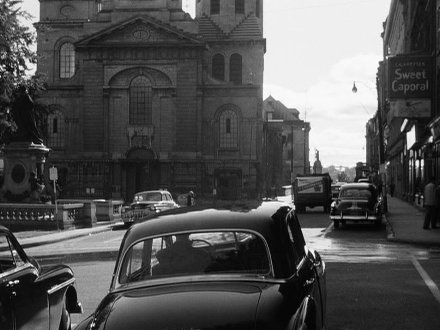
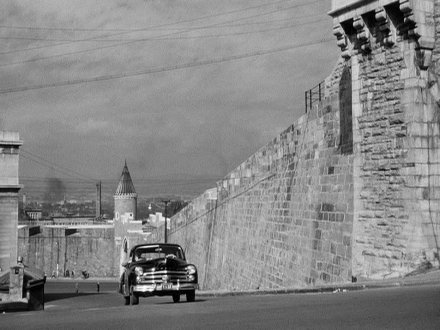
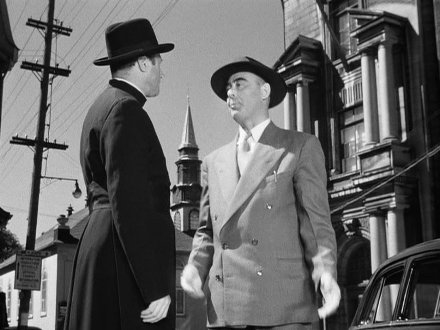
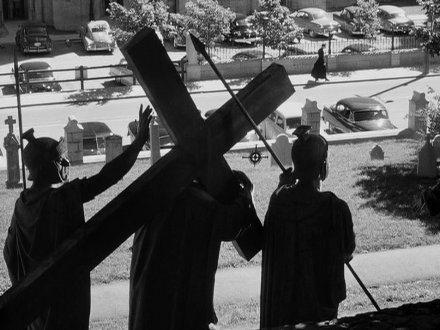
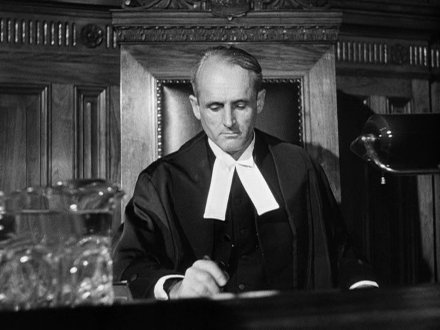
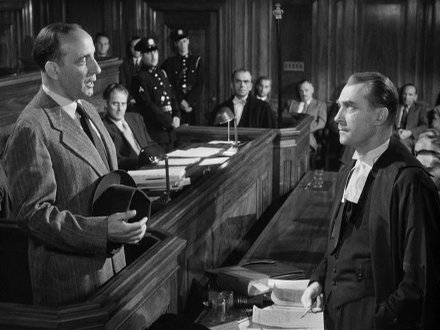
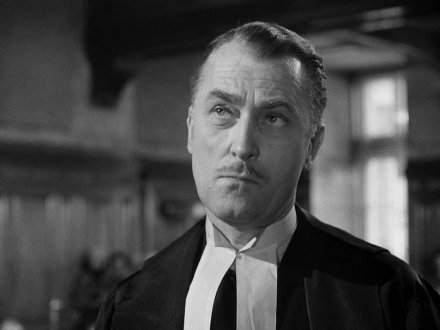
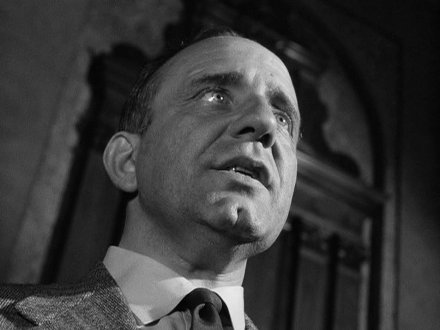
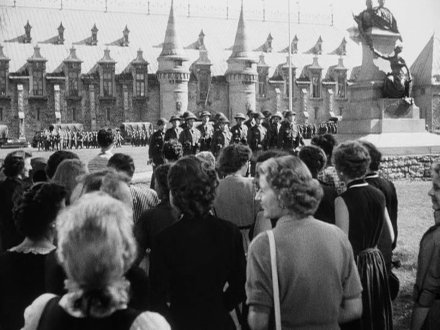
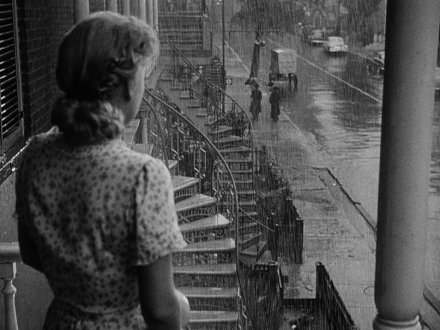
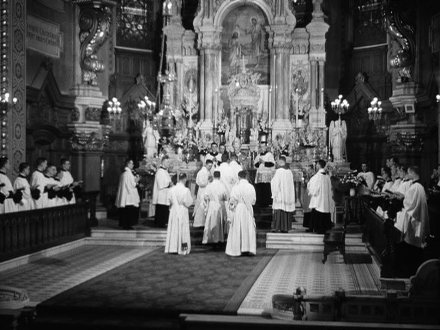
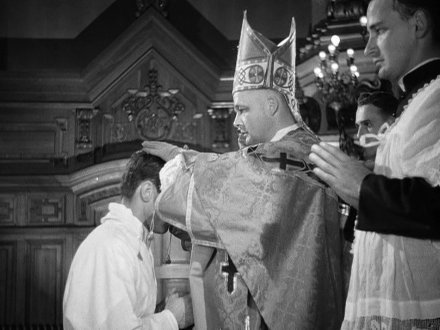
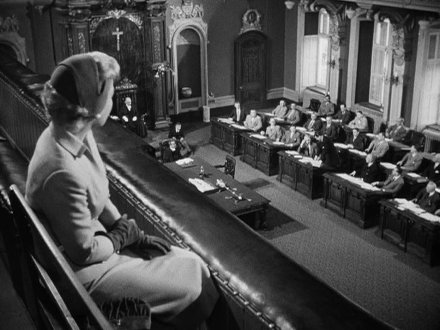
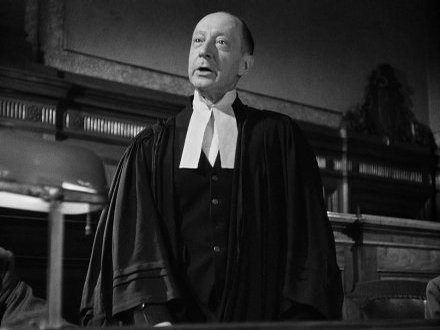
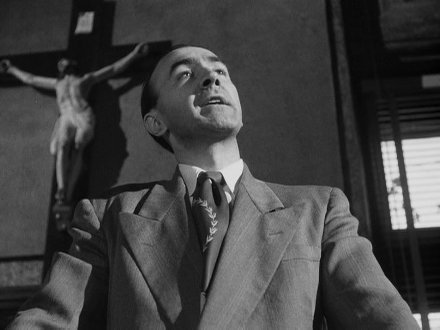
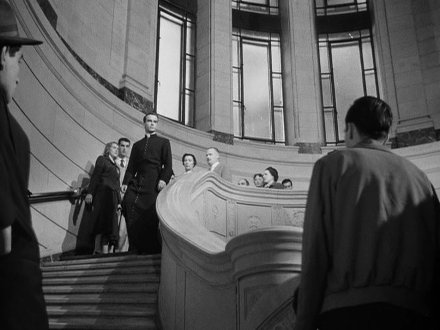
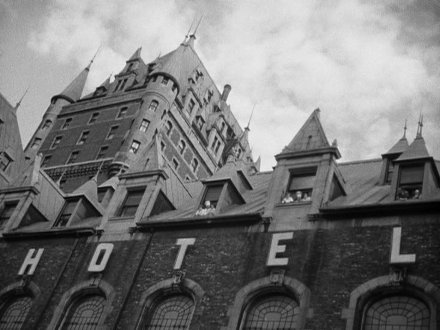
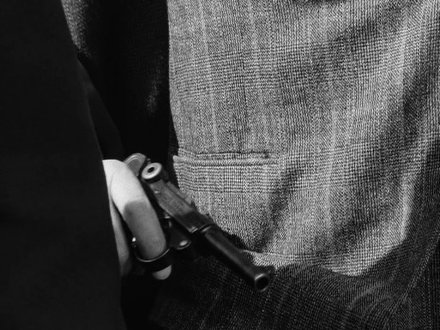
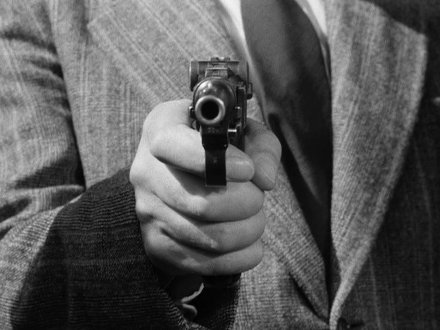
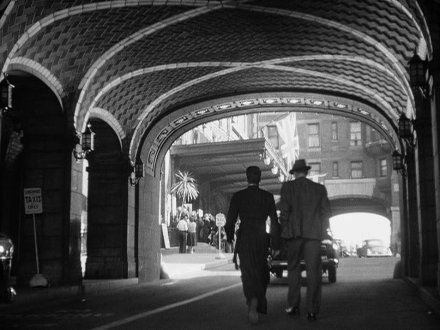
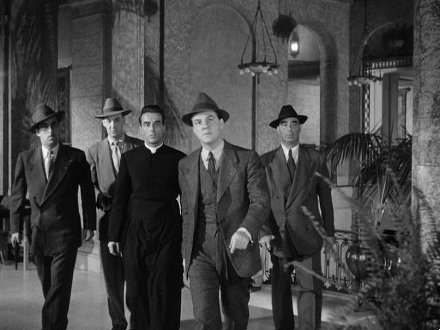
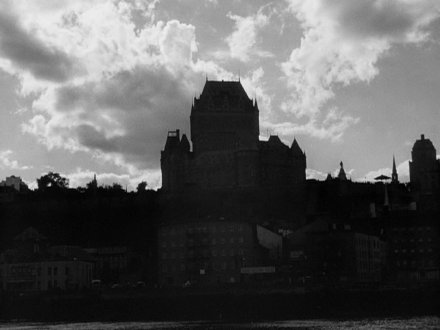
Search
Instagram: @andcusack
Click here for my Instagram photos.Most Recent Posts
- Faithful Shepherd of the Falklands April 8, 2025
- Articles of Note: 8 April 2025 April 8, 2025
- Proportionality Destroys Representation April 8, 2025
- Sag Harbor Cinema March 26, 2025
- Teutonic Takeover March 10, 2025
Most Recent Comments
Book Wishlist
Monthly Archives
Categories



Those photos convey very well the deeply film noir style of the cinematography which Hitchcock employed. Despite the grandeur of the location, the film has that quite dark and mysterious feel to it.
Thanks for sharing the photos.
I wouldn’t say they look particularly noirish. Black and white, sure. But a distinct absence of shadow, surely the key visual component in film noir.
Ace film, though.
Interesting that he makes Hannay in 39 Steps a Canadian, too (as opposed to a South African in the book).
You’ve certainly struck something here, Andrew. One thing Hitch is admired for is his ability to convey a strong sense of place in his films. Most notably in “Vertigo” (San Francisco) & “Shadow of a Doubt” (small town America — by the way, this film was his personal favorite, & is mine, too).
I haven’t seen “I Confess” but your wonderful post makes me want to rush out & find it right now. Many thanks.
This is my favorite of Hitchcock’s films. It reveals that his understanding of the Faith, and even of the priesthood, was deep and sure. The ending is unforgetable and moving, particularly, I would have thought, for a priest. Montgomery Clift is superb, and, as you rightly point out, the dark amd sombre side of Quebec is beautifully evoked.
Terrific film. Gorgeous city. I spent a week there as a 4 year-old in that hotel in your first shot. I befriended a handsome cab horse and kept slipping away to visit him. I can still recall my father storming down the street looking for me only to find me sitting in on the box, chatting with the driver and holding the reins. When he saw me, all I did was look at him and ask with big eyes “What?”…
The crucifix behind the speaker’s desk in the Quebec parliament is the result of a somewhat recent (before the late ’60’s) attempt by the provincial premier to make Catholicism something like a state religion. As would be expected with cramming an already well-received Faith down the peoples’ throats, (follwed by late 60’s cultural fallout) Quebec went from 90% observance of the Faith to a mere 10%.
State religion would be a fine thing if the results in history had been more positive. The State seems to win all the time.
It’s always bad when the state takes on the responsibility for something naturally taken care of by individuals and non-state organisations. Witness the destruction of the family throughout Europe. Witness also the NHS.
Great film. The only story I know of that hinges on that awesome thing, the Seal of Confession.
The union of state and Catholicism (i.e., Truth) was an excellent thing. It gave us Western Civilization.
I’ve never seen the film, but I’ve been to the old fortified city (the second oldest in North America) on many occasions. Suffice it to say, it is this country’s most charming and historic town, coming as it does right out of the Old World; though Imperial Victoria comes close in its own way, as does Colonial Kingston and the majesty and grandeur of parts of Ottawa.
Signore Dino I am sorry to disagree, but what produced Western Civilization was not the union of Catholicism and the State. The State as we know it did not exist in the wee hours of Christendom. FWIW, I doubt that even “Catholicism” existed then, but The Church — the extension of the Resurrected Christ into time and space — NOT a department of the State which until recently mainly operated to keep the rabble in line.
What is necessary, then, is not really the union of the state and Catholicism but of society and the Church. Christianity should be the religion of the state because it is the religion of the people, not the other way round. While requiring much more work, making Catholicism the religion of the people would do us much more good than simply passing legislative fiats declaring it the religion of the state.
Crucifixes should be in the public sphere not only because they reflect the splendor of Truth but also as a reflection of Christian society, not merely by governmental decree. To the best of my knowledge, there were no declarations in pre-reformation England that the Church was the state religion, it simply informed all aspects of society and so this did not even need to be formally enunciated. That is Western civilization in all its glory!
Well said, Andrew.
It seems to me that to formally make one religion the religion of “the state” would perforce make members/followers of other religions “outlaws” so to speak. But if the predominant religion comes to inform all aspects of a society, not through law or formal decree, but through heartfelt belief & sincere daily practice by the people, the religion itself is honored in a much more beautiful, indeed glorious, way.
Sorry, gents. You can’t have a society without government, and a society in which the majority are Catholic will naturally establish that government (like all things) in Christ and His Church. Here’s Leo XIII in his encyclical Immortale Dei.
21. There was once a time when States were governed by the philosophy of the Gospel. Then it was that the power and divine virtue of Christian wisdom had diffused itself throughout the laws, institutions, and morals of the people, permeating all ranks and relations of civil society. Then, too, the religion instituted by Jesus Christ, established firmly in befitting dignity, flourished everywhere, by the favour of princes and the legitimate protection of magistrates; and Church and State were happily united in concord and friendly interchange of good offices. The State, constituted in this wise, bore fruits important beyond all expectation, whose remembrance is still, and always will be, in renown, witnessed to as they are by countless proofs which can never be blotted out or ever obscured by any craft of any enemies. Christian Europe has subdued barbarous nations, and changed them from a savage to a civilized condition, from superstition to true worship. It victoriously rolled back the tide of Mohammedan conquest; retained the headship of civilization; stood forth in the front rank as the leader and teacher of all, in every branch of national culture; bestowed on the world the gift of true and many-sided liberty; and most wisely founded very numerous institutions for the solace of human suffering. And if we inquire how it was able to bring about so altered a condition of things, the answer is-beyond all question, in large measure, through religion, under whose auspices so many great undertakings were set on foot, through whose aid they were brought to completion.
I just watched ‘I confess’, an excellent film indeed. The cinematography was classic Hitchcock, long silent scenes, where you have only the expression of the characters to go on.
Andrew – “dear to WE anglos”? – really! “Dear to us anglos” please.
BTW the tricorn hat is decidedly in the french legal tradition, not the english.
The judge would put on his black tricorn and his white gloves when he sentenced the guilty accused to the death penalty, which only faded away in the early 1960’s…
Sorry to reply so late to this but I only came across it today.
I CONFESS is truly one of Hitchcock’s under appreciated films (along with STAGE FRIGHT from the same period) and it is good to see it receiving some of the attention it well deserves. There are plenty of “shadowy” scenes in the picture so it certainly does qualify as film noir.
One does come away from it sad, however, because the film depicts Quebec as it once was, and so very recently, before the Church shot itself in the foot in the 1960s and allowed the world to collapse around it. But when the Church comes back to its senses (which it will one day) then society will come back to its senses.
Regarding the Church/State arguments that some posters have made, allow me to recommend that they read Belloc’s “Europe and the Faith.” That will show them, once and for all, what the true relationship of Church and state should be, and once was.
Church (christianity) is the foundation of Western world, without it it was not be a thing like ‘western world’. Or at least a western wolrd who beleave in (libre arbitre) ?free will? and (raison) ~rationality?, principles who lead to the liberties we enjoy today. More than that the fact that Jesus was carpenter leaded us to a specific ethos of work. And the lost of christianity will lead to the collapse of western world, a civilization build on a set of ‘referents’ can’t continue to exist without it.